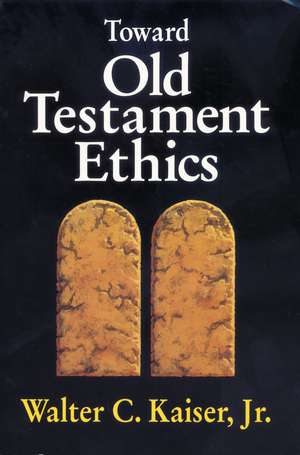Toward Old Testament Ethics
Autor Walter C. Kaiser, Jr.en Limba Engleză Paperback – 30 aug 1991
Preț: 156.64 lei
Nou
Puncte Express: 235
Preț estimativ în valută:
29.98€ • 31.26$ • 24.91£
29.98€ • 31.26$ • 24.91£
Carte disponibilă
Livrare economică 28 februarie-14 martie
Preluare comenzi: 021 569.72.76
Specificații
ISBN-13: 9780310371113
ISBN-10: 0310371112
Pagini: 360
Dimensiuni: 152 x 229 x 25 mm
Greutate: 0.55 kg
Editura: Zondervan Academic
Colecția Zondervan Academic
Locul publicării:Grand Rapids, United States
ISBN-10: 0310371112
Pagini: 360
Dimensiuni: 152 x 229 x 25 mm
Greutate: 0.55 kg
Editura: Zondervan Academic
Colecția Zondervan Academic
Locul publicării:Grand Rapids, United States
Descriere
Biblical ethics is a subject that has been almost totally neglected in this century. Only six men have written a major work on Old Testament ethics in the last hundred years, and only two of these works, both written before 1900, are in English. This lack of materials on Old Testament ethics serves to underscore the significance of Walter Kaiser's Toward Old Testament Ethics. Dr. Kaiser has no illusions about providing a simple solution to questions of Old Testament ethics. He is familiar with the complexities of this subject and begins his work in Part I by addressing such questions as: How can ethics be defined? Is there an overarching structure to ethics as presented in the Old Testament, or is there only an unrelated series of laws? Do ethics of the Old Testament have any relevance for us today? What are the exegetical principles to be used in a study of Old Testament ethics? Part II examines the moral texts of the Old Testament, in particular the Decalogue, the book of the covenant (Exodus 20:22--23:33), and the law of holiness (Leviticus 18--20). Dr. Kaiser unfolds the intention of these various laws, showing how they relate to each other and form a framework for ethics. Part III explores the content of Old Testament ethics, namely, how holiness relates to worship, work, relationship, social justice, the sanctity of life, marriage and sex, wealth, use of the truth, and motives for action. Moral difficulties in the Old Testament present stumbling blocks to many who read these books. How are we to relate to a God who, at times, seems fickle, deceptive, and hateful? How are we to champion the offensive view of women and slaves, the particulars of God choosing Israel, and the imprecations that appear from time to time in the biblical texts? Reponses to these and other difficulties from Part IV. The book concludes with a discussion of Old Testament law and New Testament believers. Dr. Kaiser shows how these laws, written thousands of years ago, still challenge God's people to live holy lives.
